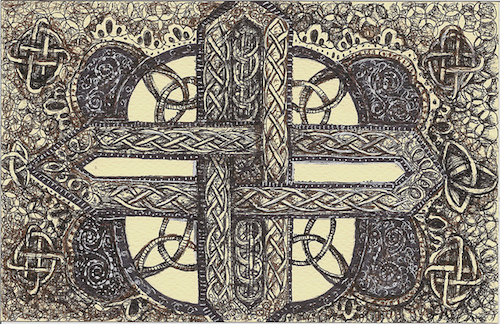We run our website the way we wished the whole internet worked: we provide high quality original content with no ads. We are funded solely by your direct support. Please consider supporting this project.

The Cross and The Trinity
Out of love for humankind, Scripture tells us, Jesus emptied himself of his divine prerogatives, set aside the glory he had with the Father from before the foundation of the world, became a human being and bore our sin as he died a God-forsaken death on Calvary (Phil 2:5-7). Though Jesus remained fully God, he entered into total solidarity with humanity by becoming a full human being. And though Jesus remained sinless, he entered into total solidarity with our sin and condemnation, to the point that Paul boldly proclaimed that Christ in some sense became our sin and became our curse (2 Cor 5:21). The cross is the culminating expression of the meaning of the Incarnation and everything else Jesus was about.
The cross reveals a God of unfathomable humility and mercy who is not above stooping to appear far less beautiful than he actually is—to appear as a guilty, crucified criminal!—in order to save us and to continue to achieve his sovereign purposes. The essence or character of God is the incomprehensibly humble, self-sacrificial love displayed on the cross.
While this revelation of course never ceases to be wonderfully mysterious, I believe it can be rendered intelligible, but only when we accept that God’s eternal nature is a union of three divine Persons who eternally give themselves wholly to one another in perfect, humble, self-giving love.
As Father, Son and Holy Spirit, God is from all eternity a self-giving God who pours himself out for “another.” Indeed, this is not only something the three Persons of the Trinity do; this is who the triune God eternally is. As TF Torrance writes,
The atoning act perfected in the cross of Jesus Christ is grounded in the very being of the eternal God, that is, in the eternal being of the Holy Trinity (The Mediation of Christ, 113).
This, I contend, is the meaning of the revelation that God is love—the kind of love that is revealed when God stoops to the infinite extreme of becoming a human and dying on a cross for a race of people who could not deserve it less (I Jn 4:8; 3:16).
The revelation of the Trinity renders the revelation of God on the cross intelligible because it means that when God humbly poured himself out on behalf of humanity by stooping to the furthest extreme possible, he was not doing something foreign to himself. To the contrary, by stooping in this way, the eternal triune God was simply enveloping humans into the self-giving, triune love that he eternally is.
As paradoxical as it sounds, when God the Son stooped to the infinite extremity of taking on our God-forsakenness on the cross, he was manifesting outwardly, in time, the perfect unity he eternally enjoys with the Father and the Spirit. Because God’s true eternal nature is a perfect, other-oriented, self-giving fellowship of three divine persons, we can begin to understand the paradoxical claim that God is revealed by becoming something that is not only different from himself (a human being), but that is even utterly antithetical to himself (our sin and God-forsakenness). The infinite intensity of the perfect love that is the eternal character of the triune God is most clearly revealed in the fact that God condescended to the furthest extreme possible out of love for a race of rebels who wanted only to crucify him.
Photo credit: molossus, who says Life Imitates Doodles via Visual Hunt / CC BY-NC-ND
Category: General
Tags: Cross, Cruciform Theology, Trinity
Topics: Attributes and Character
Related Reading

How to Interpret the Law of the Old Testament
While there are multitudes of passages in the OT that reflect an awareness that people are too sinful to be rightly related to God on the basis of the law, there is a strand that runs throughout the OT that depicts Yahweh as “law-oriented.” This label is warranted, I believe, in light of the fact…

Who Rules Governments? God or Satan? Part 1
Running throughout Scripture is the motif that depicts God as the ultimate ruler of the nations. On the other hand, the NT teaches that the ruler of nations is Satan. What do we do with these two apparently conflicting motifs? First, because OT authors tended to understand the creation along the lines of a king-centered…

Responding to Von Balthasar on the Trinity and Suffering
Recently in his blog, The Dish, Andrew Sullivan pointed to an interesting article from The Other Journal called “Evil, the New Atheism, and the God of the Trinity,” written by Jacob H. Friesenhahn. One of the reasons I love Sullivan’s blog is that he dares to include meaty theological pieces like this right alongside of…

Podcast: Why Did Jesus Say He Came to Bring a Sword?
Greg considers what Jesus meant when he said he had come to bring a sword. http://traffic.libsyn.com/askgregboyd/Episode_0312.mp3

God Became What He is Not To Reveal What He Is
We are saved because Jesus became the curse of the law for us (Gal. 3:13). So too, the way Christ freed us from the condemnation of sin and enabled us to “become the righteousness of God” was by becoming sin for us (2 Cor. 5:21). What is more, since the curse of the law includes enslavement to…

The Starting Point for “Knowing God”
While it makes sense that Hellenistic philosophers embraced knowledge of God as the simple, necessary and immutable One in an attempt to explain the ever-changing, composite, contingent world (see post here for what this means), it is misguided for Christian theology to do so. By defining knowledge of God’s essence over-and-against creation, we are defining God’s essence…
